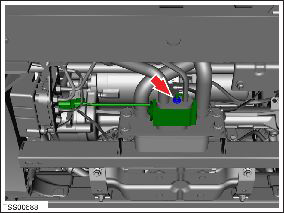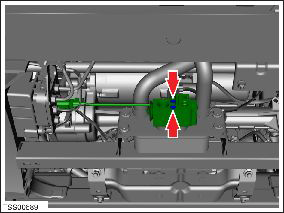Tesla Model S: TXV Valve - Chiller (Remove and Replace)
Tesla Model S (2012-2025) Service Manual / Thermal Management / TXV Valve - Chiller (Remove and Replace)
Removal
- Recover refrigerant from the vehicle (refer to procedure).
- Remove the front skid plate (refer to procedure).
- Remove the nut that secures the pipe retaining plate to the TXV
(torque 12 Nm).

- Disconnect the refrigerant pipes from the TXV. Caution: Plug pipe connections to prevent ingress of moisture or dirt. Caution: Remove and discard O-rings.
- Disconnect the TXV solenoid valve connector.
- Remove the bolts (x2) that secure the TXV to the battery chiller
(torque 6 Nm).

- Remove the TXV from the battery chiller.
- Installation procedure is the reverse of removal, except for the following:
- Replace the A/C pipe O-rings. Caution: Lubricate new O-rings with clean refrigerant oil.
- Replace the battery chiller O-rings.
- If the new TXV does not have a solenoid, install a coolant valve dummy plug on the vehicle-side electrical harness connector.
READ NEXT:
 Pressure Transducer - Low Pressure (Remove and Replace)
Pressure Transducer - Low Pressure (Remove and Replace)
Removal
Recover refrigerant from the vehicle (refer to procedure).
Remove the underhood storage unit (refer to procedure).
Disconnect the electrical connector from the pressure
tr
 Battery Chiller and TXV Assembly (Remove and Replace)
Battery Chiller and TXV Assembly (Remove and Replace)
Warning: If the 12V power supply is disconnected, do
not attempt to open any doors with door glass in closed position.
Failure to follow this instruction could result in door glass
shat
 Cooling System - Partial Refill and Bleed
Cooling System - Partial Refill and Bleed
Refill
Caution: Use the specified coolant only. In this manual, refer
to General Information > Capacities, Fluids, and Lubricants >
Fluids.
Remove the coolant reservoir cap (r
SEE MORE:
 Exterior/Interior Overview
Exterior/Interior Overview
Exterior Overview
NOTE: Depending on market region, vehicle configuration, and options
purchased, your vehicle may look slightly different than described.
Exterior lights
Door handles
Charge port
Autopilot cameras
Exterior mirrors
Hood/Front trunk
Front/rear tow eye cover
Wheels and tir
 Tail Light Assembly (Non-Motorized Charge Port) - LH (Remove and Replace)
Tail Light Assembly (Non-Motorized Charge Port) - LH (Remove and Replace)
Special tool required for this procedure:
Supplier
Part Number
Description
Tesla
1054190-00-A
Feeler Gauges
Removal
Open the charge port.
© 2019-2025 Copyright www.tesms.org

